Latest posts by Devin McKinney (see all)
- What John Lennon Thinks of Donald Trump - November 14, 2016
- The Meaning of Fun: The Paul is Dead Rumor - February 3, 2016
- BEATLES-STREEP-SHEA SHOCKER: IT’S NOT HER!!!! - August 13, 2015
DEVIN McKINNEY • For the enjoyment of anyone with the requisite interest and 45 minutes, here’s myself and a friend, music writer Tom Kipp, debating the question at the Experience Music Project Pop Conference, EMP Museum, Seattle, this April 20 past. Can anyone here guess which album I picked?
That’s bon vivant Sean Nelson as our m.c., and H. B. Radke running the A/V.


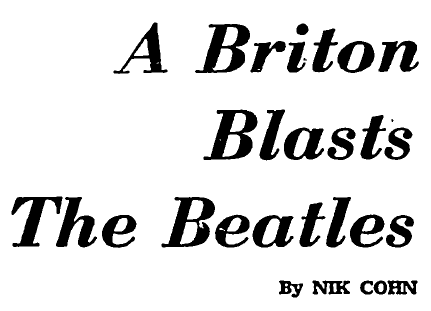

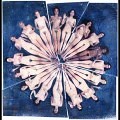
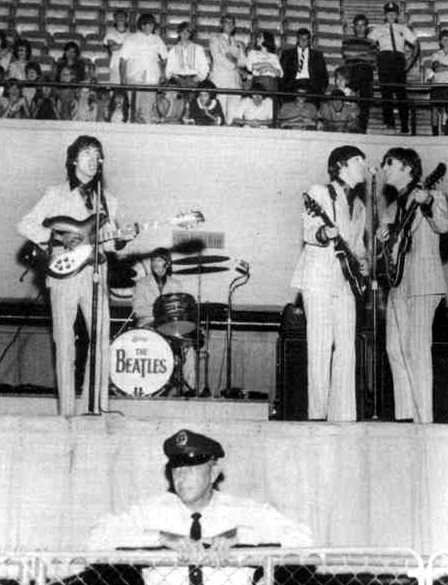

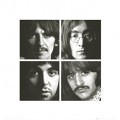
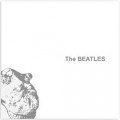
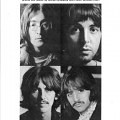
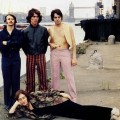

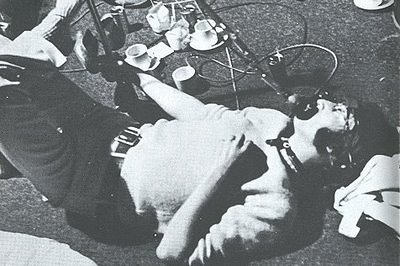
Devin, how much money would it take for you to do videos, plus voice-over, for all the Beatles albums? I will run the Kickstarter on that. Email me privately.
Tom’s not the right person to argue this, as much as I love Beatles for Sale, because
a) he doesn’t like or understand McCartney; and
b) what he loves is post-60s music that people interact with differently.
Someone like that isn’t really going to understand what is so amazing about The Beatles; and is going to diminish them to the scale of what has come since–dismiss them as hype and their fans as zombies unwilling to move on, or whatever. He didn’t call them “a boy band,” but…
The Beatles are an historical phenomenon, and understanding them requires putting the past on equal footing with the present. It also requires a willingness to untangle one’s own preferences from the larger historical story going on. This is difficult enough for historians to do, much less rock critics.
After Pepper, there was a business-wide splintering, with bands aimed at certain demos and marketed as lifestyle choices. This is simply the corporate entities in charge of production and distribution, trying to extract more sales out of an audience. From ’63-68 there was a kind of centrality coming out of restricted product; from ’68 onwards, there are smaller phenomenons that aggregate into bigger total sales. This is standard operating procedure–you see this in comedy from 1972-80, and 1980 after. It does expand profits and fanbase. It also destroys the wider cultural centrality that I endlessly argue is the hallmark of a masterpiece. It’s why today’s version of Robin Williams will not have Robin Williams’ 50-year-long career. Today’s version is smaller scale.
I find it interesting that Tom’s pick comes from a time where The Beatles had absolute cultural centrality, Fall 1964. Not, say, 1969, when they were producing more influential, more innovative, more current sounding work.
What White IS, is The Beatles attempting to capture 1968 like they did 1967, and ’66, and ’65 and ’64 before that–and through their genius they mostly succeed. After that things became too big and varied even for them. By Abbey Road there is no longer a center to capture. {continued next comment]
[to continue, for real gluttons]
I found what Tom said interesting, but somebody who looks at music for what it has been since 1968–lifestyle choice designed to define membership in a marketing niche–isn’t going to get the fundamental historical fact of The Beatles phenomenon, which was its singularity, and sincerity. With no idea what was waiting for them, J/P/G/R abandoned themselves to the music, and the experience. Amazingly, the world followed suit. Nobody knew it was going to happen, and soon after it had, it was way too big to manage or manipulate.
“Sgt Pepper” is important because THAT album, not Jimi’s first or VU’s first, captured the attention of the entire goddamn world the moment it came out. That fact has to outweigh individual preferences–if “masterpiece” or “best” is to mean anything more than “my favorite.” And Pepper was the last time The Beatles stood atop the mountain; Pepper was the next stage: Beatlemania with a whole set of cultural, economic, and even spiritual assumptions behind it. In Pepper, kids glimpsed a whole new way to live; nobody saw that in White, and that’s not White’s fault, but it’s not nothing, either.
Ever since The Beatles happened, people have been trying to find “the angle” on it–“That kid never existed; Brian Epstein bought a bunch of discs on the sly” “Capitol manufactured Feb ’64”–because they can’t conceive of anything like that happening organically. They live in a cynical world of hype and outsmarting hype, but that’s a map they are putting on reality, not reality. The Beatles were not, Lennon’s protestations aside, a cynical enterprise. You can’t fool so many people so often.
Anyway, Devin, you ALMOST convince me on the White Album, on the merits of the music. But as you rightly mention, White is about its era, too, and that’s what keeps it from being The Beatles’ masterpiece.
I think Pepper and MMT are as in-tune with the group as it existed at that time, and that era–which is, I would argue, a tragic cultural road not taken. Whereas 1968 was the resumption of pre-60s, pre-Beatle cultural patterns; a return to the dead-ends of violence, capitalism, materialism, drugs as anesthetic, compulsive competition, and so forth.
The cultural curdling of the West which began in 1968–the backing away from genuine alternatives–was disastrous. White reflects that, and must be docked for its violence and disharmony and cynicism and lack of belief. Are Pepper and MMT lesser songs reflecting a better ideal? Perhaps. But White is definitely great art reflecting chaos, confusion, disharmony and pain. And many, many bands can give you that, and have, and do–but only The Beatles really encompass the optimism and humanity of the pre-1968 Sixties. And so I would pick an album that encompasses those qualities over White.
Just once, I wish there was a music writer who didn’t like or understand Lennon. The reason it’s always McCartney is (1) because some music journalists are shallow and John’s caustic personality appeals and (2) because, unlike John, Paul straddles two very different musical worlds, like the Gemini he is. He would have been comfortable in the 20’s, 30’s and 40’s, and he’s comfortable in the rock-and-roll era.
I like Beatles for Sale, but it’s pretty patronizing to even suggest it was the band’s best album. That smacks of contrarianism for the sake of it.
I have to side with Devin. As the years pass, The Beatles album is the one I still listen to the most and always find something new to enjoy. But I could also make a case for Rubber Soul, or for Sgt. Pepper, now the most under-rated, overrated album of all time. 😉
— Drew
Thanks for the compliment, Mike. I’ll just note that although it was my idea to team up for a presentation, to do “best Beatles album” was Tom’s.
Often the contrarian is only that which veers too far from what has been established to others’ satisfaction. On the question of best Beatles album, though, nothing has been established, except that it can’t be anything pre-“Rubber Soul.” That’s a dogma, and whenever I tell people that my SECOND favorite Beatles LP is “The Beatles Second Album” (Capitol, 1964, made up of mostly ’63 material), I get the same response: “You’re just being contrarian.” And I tell them to go back and listen to “She Loves You” and “Money” and “Please Mr. Postman” and “You Really Got a Hold on Me” and “Long Tall Sally” etc., and then tell me I haven’t got a case.
I thought Tom’s choice a curious one, still ‘n’ all, and could only smile ruefully and shake my head at his by-the-book McCartney-bashing. (Note, though, that once upon a time it would have been outrageously contrarian to call
“RAM” a masterpiece, so these things ain’t chiseled in rock). Nor do I agree, obviously, with his downgrading of the later albums. But there’s nothing insincere or attitudinous (word?) about Tom Kipp or his musical judgments; i.e., he didn’t pick FOR SALE “just to be different.” Everything he says comes from a place that is thoughtful, considered, critical, and informed by a breadth of listening and discernment unmatched by anyone else I know.
I find enrichment and edification in all that you say, Mike, as always, but one thing to remember is that the Beatles fit into people’s lives in all kinds of different ways. For some of us, that’s at the very center of things; for others, it’s at No. 17. Tom is older than both of us, so should theoretically be closer to the pre-1968 model you envision; yet his experience, desire, and viscera pull him more forcefully in other directions, specifically, to proto-punk and post-punk. There are legitimate reasons for putting that, rather than the Beatles, at the center of your musical landscape, nor is there necessarily anything “lifestyle choice” about declining to accept the Beatles as the be-all and end-all.
One reason “Pepper” caught everyone’s attention in 1967 is, of course, that everyone was looking out for what the Beatles would do next. “Are You Experienced” and “VU/Nico,” because they were by unknown artists bucking the mainstream (esp. the latter), they literally seemed to come out of nowhere. That they are minority statements by debut artists doesn’t make them any better than “Pepper,” but it does explain why they couldn’t hope to win the ear of the world as “Pepper” did. Surely “Pepper” is important for reasons other than, or beyond, that it captured the attention of the whole world, where the Hendrix and VU debuts did not. If mere scale of recognition is the arbiter of importance, then “Pepper” is indeed the greatest album ever, with “Thriller” a solid number two.
On the way out, I also have to engage this: if being “about its era” precludes White from being the Beatles’ masterpiece, where does that leave “Pepper”? Or “MMT”? Or even “Revolver”? Far from being apart from or outside of the world in which they were made, all are deeply and essentially formed by numerous aspects of it. Separating the Beatles in any of their phases from a social-historical context (the work responding to the world as the Beatles perceived it, straight or drugged) is a losing game, or a victory not worth winning.
Devin, excellent point about the Beatles not needing to be at everyone’s center, music-wise: and it’s always interesting to hear a thoughtful, well-informed defense of one album being a group’s best.
I do think that at this point “Sgt. Pepper’s” is often ridiculously underrated. George Starostin (whom I can never sufficiently praise) sums up what “A Day In the Life” is doing on the album this way:
” . . . the bulk of Sgt. Pepper is utopian in nature. The ten main songs conspire to show you what could have been in a perfect world — not «perfect perfect», as in completely free of problems and issues, which would be very boring, but «perfectly interesting», as in full of surprises, revelations, inspirations, artistry, and absurd happenings. Then the illusionism is over, and ʽA Day In The Lifeʼ, alternating between John’s mini-sketches of life’s stupidity and senselessness and Paul’s mini-sketch of life’s routine, sweeps the whole circus show away. In other words, Sgt. Pepper builds itself up, slowly and expertly, only to self-implode in its last track. The final grand piano chord, all of its fifty seconds or so, solemnly accompanies the wind blowing away the debris.
Unsurprisingly, when I was just a kid, I hated ʽA Day In The Lifeʼ — loved it for its melodicity, catchiness, and depth, of course, but subconsciously hated it because, for a whole five minutes, it was telling me that the fun is over, and that Hollywood forgot to supply a happy ending. In a way, I still hate it, as much as that childhood feeling is still with me, feeling as sorry for Lucy In The Sky, Lovely Rita, and Mr. Kite as one may feel about one’s favorite characters killed off at the end of a Shakesperian tragedy. But what is it, really, if not the firmest proof of the ultimate greatness of Sgt. Pepper? Without this particular direction of the flow, the album on the whole could be no different, in attitude and atmosphere, from, say, a Moody Blues record. With it, it is simply one of the greatest «musical oratorios» ever made. To hell with the pretentious naysayers.”
+1
Well I don’t know how you can say Tom Kipp “is thoughtful, considered, critical, and informed” on the one hand, and then point out his boring “by-the-book McCartney bashing.”
But I suppose every critic is really just a fan with their own subjective prejudices. And Kipp’s posts bashing McCartney for anything he’s done post-1973 are exceedingly tiresome. But then I’m a Paul fan, and I see both good and bad in his post-1973 work — as is the case for Dylan, Bowie, Neil Young, etc., etc. It’s only McCartney, though, who gets endlessly bashed for his worst work.
Tiresome? Hell yes.
— Drew
“By the book” doesn’t mean Tom hasn’t read the book, doesn’t agree with the book, doesn’t like the book. It certainly doesn’t mean that he’s knee-jerking it, like so many critics and fans who don’t take time to really listen. By that I meant only that the complaints are, to Beatle people, more than familiar, because they are and have been widely held. That’s why there’s a book.
“By that I meant only that the complaints are, to Beatle people, more than familiar, because they are and have been widely held. That’s why there’s a book.”
Well the book is wrong. And it was written by Lennon fanboys like Jann Wenner who somehow felt that they needed to bash Paul in order to praise John. The recent Greil Marcus interview where he admitted that Wenner had pressured the reviewer of Paul’s debut solo album to change a positive review to a negative one — purely because Wenner blamed Paul for breaking up the Beatles — shows what a raw deal Paul got and still gets, including from writers like Kipp.
Sorry I know I’m seeming argumentative. And I know, Devin, that you feel the need to defend him. But a reviewer who dishes it out has to be able to take it. And I found his comments on McCartney to be utterly simplistic.
— Drew
@Devin,
I also agree that The Beatles’ best could be pre-65. Honestly, I found Tom’s choice of BFS refreshing and interesting; I just found what he said to be the thoughts of someone who likes 16 other bands better. That is, somebody who shouldn’t be debating with you, because he’s not going to bring the same limitless passion and erudition that you do. Another topic, sure; not that one. So for attitudinous (let’s declare it a word) let’s substitute “not sufficiently serious.”
And–not to bash Tom, really not–this lack of seriousness comes out in his comments re: McCartney; and his swipe at the “out/in” version of Revolution 1; and so forth. Maybe he believes everything important to say about The Beatles has already been said; but you deserved a better foil.
Don’t misunderstand my use of “lifestyle choice”–media that is demographically aimed isn’t automatically less valuable or meaningful or well-crafted. It has to resonate with someone in some way to survive. But punk–like psychedelia, or funk, or roots-rock, or New Wave, or glam, or or or–is one particular style, aimed at one particular group. “I like punk so I dress like x and this says y about me.” It’s marketing, packaging, a limiting that works against great art. Pepper isn’t “music as lifestyle”; but MMT is. That’s why Pepper is unquestionably greater than MMT–even though I listen to MMT more, and the actual songs on MMT might be as good or better, IMHO.
This is what I mean by lifestyle choice, and what is so remarkable about The Beatles is that, while you could argue that they played that game at several points in their career, what they were and what that meant changed almost year-by-year. So what I got from Tom was this: “Beatles For Sale is the kind of Beatles that fits most comfortably for me. I don’t like it that much–I like 16 other bands better–but it reinforces my ideas about rock.” There’s nothing wrong with that, we all seek out stuff that reinforces what we think and ignore the rest.
[comment cont’d]
@Devin,
“If mere scale of recognition is the arbiter of importance, then “Pepper” is indeed the greatest album ever, with “Thriller” a solid number two.”
I was 13 when Thriller came out and nobody–not me, not 15(?)-year-old you, and not Casey Kasem on “America’s Top 40”–believed that Thriller was anything more than a really, really good pop album. Whereas Pepper was hailed immediately as a harbinger of something genuinely new in pop culture; that’s why it practically birthed rock criticism as we know it; that’s why there was a big story in Henry Luce’s silent majority rag Time. (The 1982 equivalent would’ve been Thriller getting written up by William F. Buckley in The National Review.)
Thriller was not a discernible flowering of a much larger intellectual movement; Pepper was. And even though it wasn’t serious (and that itself is a political statement), Pepper was utterly political, then and now; Especially in June 1967, “When I’m 64” is as much a political statement as Lennon ever made, if you look at it the right way. Pepper’s psychedelic Victoriana isn’t just fashion; it’s intentional subversion of the idea of Empire by people who KNOW it leads to the fields of Flanders. “Within You Without You” isn’t just sitar noodling, it comes from the same well as Kerouac’s Dharma Bums and Alan Watts’ books (only because it’s English, it’s influences are Indian). I’ve never thought about this, but “A Day in the Life” is probably the national anthem for every curdled empire. Pepper is youth culture demanding a place at the table, educated, optimistic, ready to change the world. It is the flower in the gun, an attempt to answer the question, “After war, what?”
That this nonviolent, utopian, Eastern-inflected, anti-capitalist, pro-sex, communal, post-Christian, ecological, humanist, antimaterialist, anti-technological and anti-corporate movement was unable to totally transform the world via pop songs–that it was effectively counterattacked and turned against its own values, and went from “All You Need Is Love” to “Revolution” in 12 months–doesn’t mean it was a mass hallucination, or all wet, or was just about crusties getting laid. That it was successfully commercialized doesn’t mean that it was a hustle. These “hippie” values persist–they’re everywhere from yoga to electric cars to paternity leave for dads to Obama. And it’s the durability and transformative power in the era and intellectual movement which nourished Pepper, that allowed The Beatles to create a masterpiece.
[comment cont’d]
@Devin,
On the way out, I also have to engage this: if being “about its era” precludes White from being the Beatles’ masterpiece, where does that leave “Pepper”? Or “MMT”? Or even “Revolver”?
IMHO, a masterpiece not only has to be a brilliant piece of work by an unquestionably major artist, but also tends to epitomize an important time or place that has come to stand in for eternal values. The Mona Lisa’s masterpiece status isn’t just about the painting; it’s also about Leonardo and what he represents to us, Renaissance Florence and what it represents to us, feminine mystery, and so forth and so on. It’s the totality that makes us designate that painting as a masterpiece, and characterize, say, Giotto or Raphael or Cimabue as merely important painters with lots of marvelous individual paintings, many of which innovated within the field.
So, to me, Pepper’s a masterpiece in part because of the content, partly for its innovative spirit, partly for the role it plays in the Beatles’ story, partly for the epochal time it evokes (the “Summer of Love”) so precisely, and partly for the timeless values it seems to put forth (see Nancy’s Starostin review). White’s a great album, but its timing is a bit off to be a masterpiece. Just like Rubber Soul and Revolver, the music is superb, but everything around it isn’t quite right–the conditions aren’t quite there yet for a masterpiece.
White is a fascinating text, deep and rich and mostly unexplored. Strictly as a text, White is by far the most fun Beatle album to address. But to me, White’s the opening of a tragedy, probably summed up best in this quote:
“San Francisco in the middle sixties was a very special time and place to be a part of. Maybe it meant something. Maybe not, in the long run, but no explanation, no mix of words or music or memories can touch that sense of knowing that you were there and alive in that corner of time and the world. Whatever it meant. There was madness in any direction, at any hour. If not across the Bay, then up the Golden Gate or down 101 to Los Altos or La Honda. You could strike sparks anywhere. There was a fantastic universal sense that whatever we were doing was right, that we were winning. And that, I think, was the handle – that sense of inevitable victory over the forces of Old and Evil. Not in any mean or military sense; we didn’t need that. Our energy would simply prevail. There was no point in fighting – on our side or theirs. We had all the momentum; we were riding the crest of a high and beautiful wave. So now, less than five years later, you can go up on a steep hill in Las Vegas and look West, and with the right kind of eyes you can almost see the high-water mark – the place where the wave finally broke and rolled back.”
Once I heard “Beatles For Sale”, well, no need to watch the rest of the video. Mr Moonlight, Baby’s In Black… is this a joke? Am I missing something?
It’s all subjective anyway – there is no best Beatle album, just favorite.
On my Ipod I have a 100 Beatle songs. From which album the most songs? A Hard Day’s Night, the British one.